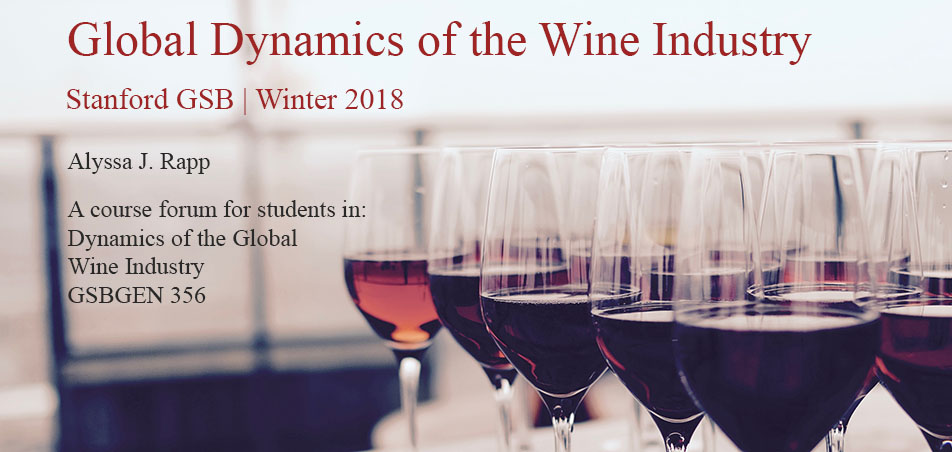Private label wine is a wine created for just one
seller. The seller, like a hotel or
restaurant, will work with a winery to develop the right flavor profile, then
bottle and sell the wine, retaining exclusive rights to the label and brand.
The practice is big business. Folio Fine Wine Partners, the startup
by fourth-generation members of the Mondavi clan, make the Grand Hyatt’s Canvas
line. Even Shake Shack partners with
Frog’s Leap Winery for its private label.
Traditional grocery stores are the strongest drivers of growth in the
sector. Trader Joes’ eponymous wine offerings
and the Kirkland Signature wines available at Costco are two of the most
well-known private labels. An
independent blog even devotes a full page to
reviews of Kirkland Wines.
The rise in popularity of private label wines can be traced
to its margins. They are substantially
higher for both the producer and the retailer.
For producers, margins can be 10-15% higher, and for retailers, it can
be double.[1] This margin bump is attributable to several
factors. First, wineries don’t have to
invest in marketing their wares since the retailers that own the label will do
the selling. Second, private label wine
is often made from leftover grapes from an abundant year, which sell at a
discount.
More troublingly for regulators, purveyors of private label
wines often skip the wholesaler tier of the three-tiered system. Because wineries are creating product
exclusively for the retailer, there is no need to go through a wholesaler to
sell their wares. However, most states
require wholesalers and distributors to offer every wine they sell to every
retailer with whom they have a relationship.
Because private label wines are by definition exclusive to one retailer,
they exist in a legal gray area.
Indeed, the gadfly website, IdahoStatesman.com discussed
this very dynamic, asking, “how is Trader Joe’s able to reach an agreement with
its distributor that Charles Shaw wine be distributed only to Trader Joe’s and
no other Idaho wine retailers?”[2] Wine distributors were uninterested in
talking to IdahoStatesman, but an Idaho State Police Spokesperson did confirm
that if a distributor carries a wine product, “it has to be available to other
retailers.”
Where does this leave prospective private labelers? Probably in the clear, for now. The General Counsel of the California Alcohol
and Beverage Control Board (California’s primary regulator in the area) put it
succinctly. “Do we enforce stupid laws
to try to get the legislature to change them? No.”
[1] https://daily.sevenfifty.com/private-label-wines-a-peek-behind-the-label/
[2] http://www.idahostatesman.com/news/business/article41567880.html.

It would be interesting to see if regulations regarding private label sales are enforced more strictly across some states than others. In class, we talked about how some states are much more strict with import restrictions than others – with illegal imports even being a jailable offense in some cases. While I couldn't get data on private label sales by region, I'd expect it to be uneven throughout the country, perhaps reflecting some of the regulatory challenges associated with it. Searching private wine label companies reveals a large number of vineyards that will help you design your own wine and get started, suggesting that there is a lot of appetite for this concept from the supply side. Combine that with the high margins for those who distribute it, and I'd say private labels are in a good position to grow for some time!
ReplyDeleteJordan,
ReplyDeleteThanks for posting this. I have actually been wondering about this for some time now. Prior to the GSB, I spent several years investing in the consumer and retail industries and spent far too much time analyzing grocery stores and other retailers like walmart and target. I think you make a good point regarding the margins. I would also add to your statement that the margins are even further magnified when you consider that a normal grocery store like Kroger / Walmart / etc. has margins in the low single digits. This is hugely significant.
Separately, I actually reached out to a friend of mine that works at one of these large retailers to understand how they get around the three tiered system and they basically told me to look at the lobbying spend. When you add up the lobbying spend for the big national trade associations (National Retail Federation, Grocery Manufactures Association, National Association of Convenience Stores, etc.) you get to a number that is upwards of $50m per year. That dwarfs anything that the big distributors contribute. So when you look through that lens, it can shed some insight on why this is allowed. I agree though that it will be interesting to see how this plays out.
Thanks for the thoughtful comment, David. The Wine Institute has great resources on wine laws by state, and discusses enforcement as well. Check it out at the link below!
ReplyDeletehttps://wineinstitute.compliancerules.org/state-map/